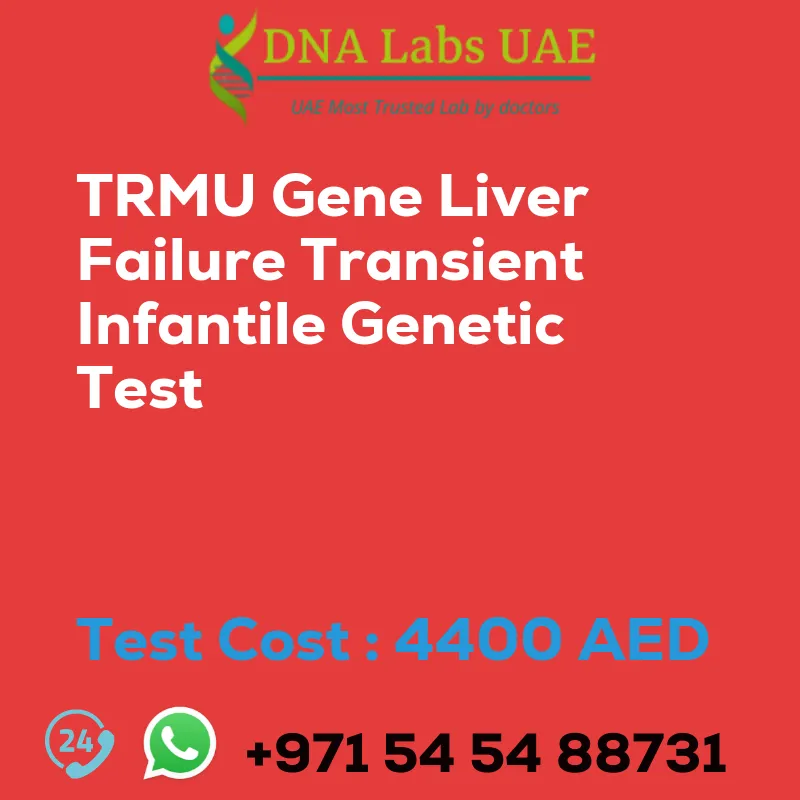TRMU Gene Liver failure transient infantile Genetic Test
Test Name: TRMU Gene Liver failure transient infantile Genetic Test
Components: Blood or Extracted DNA or One drop Blood on FTA Card
Price: 4400.0 AED
Sample Condition: Blood or Extracted DNA or One drop Blood on FTA Card
Report Delivery: 3 to 4 Weeks
Method: NGS Technology
Test type: Hepatology Nephrology Endocrinology Disorders
Doctor: General Physician
Test Department: Genetics
Pre Test Information: Clinical History of Patient who is going for TRMU Gene Liver failure transient infantile NGS Genetic DNA Test. A Genetic Counselling session to draw a pedigree chart of family members affected with TRMU Gene Liver failure transient infantile NGS Genetic DNA Test gene TRMU
Test Details: TRMU gene is associated with a rare genetic disorder called liver failure transient infantile (LFTI). This disorder is characterized by acute liver failure in infancy, which may be transient or progress to chronic liver disease. It is caused by mutations in the TRMU gene, which is involved in mitochondrial protein synthesis. Next-generation sequencing (NGS) is a genetic testing method that allows for the simultaneous analysis of multiple genes or the entire genome. In the context of LFTI, NGS can be used to identify mutations in the TRMU gene that may be responsible for the disorder. This can help in confirming the diagnosis and providing appropriate genetic counseling to affected families. NGS-based genetic testing involves the sequencing of DNA or RNA samples, followed by bioinformatics analysis to identify any mutations or variants in the TRMU gene. This technology has revolutionized genetic testing, as it allows for a more comprehensive analysis of the genome, enabling the identification of rare and novel genetic variants. In the case of LFTI, NGS genetic testing can aid in the early diagnosis of the disorder, enabling prompt medical intervention and management. It can also help in identifying carriers of the TRMU gene mutation within families, allowing for informed family planning decisions. Overall, NGS genetic testing of the TRMU gene is a valuable tool in the diagnosis and management of liver failure transient infantile, providing crucial information for affected individuals and their families.
| Test Name | TRMU Gene Liver failure transient infantile Genetic Test |
|---|---|
| Components | |
| Price | 4400.0 AED |
| Sample Condition | Blood or Extracted DNA or One drop Blood on FTA Card |
| Report Delivery | 3 to 4 Weeks |
| Method | NGS Technology |
| Test type | Hepatology Nephrology Endocrinology Disorders |
| Doctor | General Physician |
| Test Department: | Genetics |
| Pre Test Information | Clinical History of Patient who is going for TRMU Gene Liver failure transient infantile NGS Genetic DNA Test. A Genetic Counselling session to draw a pedigree chart of family members affected with TRMU Gene Liver failure transient infantile NGS Genetic DNA Test gene TRMU |
| Test Details |
TRMU gene is associated with a rare genetic disorder called liver failure transient infantile (LFTI). This disorder is characterized by acute liver failure in infancy, which may be transient or progress to chronic liver disease. It is caused by mutations in the TRMU gene, which is involved in mitochondrial protein synthesis. Next-generation sequencing (NGS) is a genetic testing method that allows for the simultaneous analysis of multiple genes or the entire genome. In the context of LFTI, NGS can be used to identify mutations in the TRMU gene that may be responsible for the disorder. This can help in confirming the diagnosis and providing appropriate genetic counseling to affected families. NGS-based genetic testing involves the sequencing of DNA or RNA samples, followed by bioinformatics analysis to identify any mutations or variants in the TRMU gene. This technology has revolutionized genetic testing, as it allows for a more comprehensive analysis of the genome, enabling the identification of rare and novel genetic variants. In the case of LFTI, NGS genetic testing can aid in the early diagnosis of the disorder, enabling prompt medical intervention and management. It can also help in identifying carriers of the TRMU gene mutation within families, allowing for informed family planning decisions. Overall, NGS genetic testing of the TRMU gene is a valuable tool in the diagnosis and management of liver failure transient infantile, providing crucial information for affected individuals and their families. |








